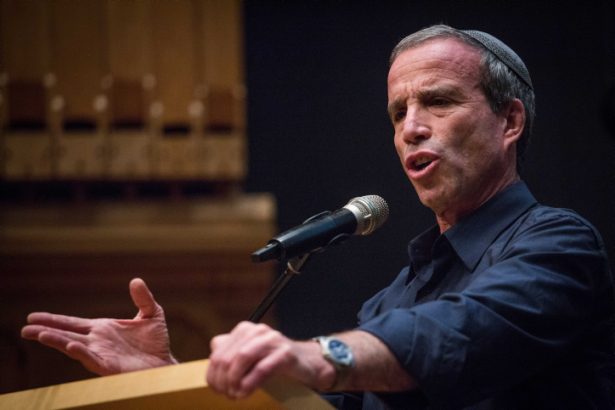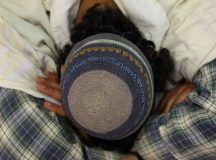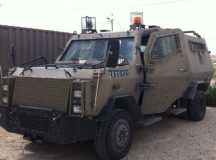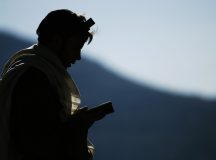Elazar Stern is an Israeli politician and former soldier. He served as a Major General in the IDF and as Head of the Manpower Directorate. In 2013, he became a member of the Knesset for Hatnuah, and currently serves as an MK for the centrist Yesh Atid party led by Yair Lapid. He spoke to Fathom assistant editor Samuel Nurding on 31 January 2017 about the contested relationship between state and religion in Israel.
Part 1: Purity of Arms after the Azaria Trial
Samuel Nurding: The trial of Elor Azaria has divided Israel and prompted debate about traditional Israel Defence Forces (IDF) values. Some fear the IDF is losing its traditional role as an above-politics institution that erodes divisions in Israeli society, instead becoming a cultural battleground for different conceptions of what it means to be Jewish/Israel. In addition, you yourself have discussed the widening gap between the political Left and Right in Israel, arguing that values that were previously shared have now become the preserve of one or the other. What did you mean by this?
Elazar Stern: I don’t think we should have to make a choice between whether one’s identity prioritises Jewish over Israeli or Israeli over Jewish. I am both and there is no conflict between them. And I believe Israel does not have either the right to exist nor will it be able to survive in the Middle East if it loses either its Jewish or democratic character. What frightens me most about the future of the state is that in less than a decade there will no longer be any Holocaust survivors or early Zionist pioneers alive, and if we don’t succeed in defining what it means to be Jewish to our kids, regardless of whether they define themselves as religious or not, then we won’t be able to survive in the region.
The involvement of civil society in the Azaria trial was unprecedented. This is due to the status of the IDF in Israeli society as the most popular institution, unfortunately even more popular than the Supreme Court or Knesset. Everyone has been a soldier, so everyone has an appreciation of what it entails to serve one’s country. The problem for the IDF stems from its complicated mission in the West Bank, where the political Right thinks that being patriotic is only its preserve, and being in favour of human rights belongs to the political Left. This isn’t correct. Being a patriot doesn’t just belong to the Right and a commitment to the concept of tohar haneshek, the purity of arms, doesn’t just belong to the Left.[i] Unfortunately in Israel the Left blames the Right for incitement and the Right believes the Left doesn’t love the country. Before I rewrote the IDF code of ethics, it did not include the words ‘love of Israel’ because people associated these words with supporting the settlement movement.
At the same time almost all of the supporters of Azaria belong to the Right and it was clear that they opposed the value we have traditionally placed on purity of arms. How has this happened? One should be able to be in favour of human rights and to be on the Right. Likewise, one should be ready to sacrifice one’s life to defend Israel and to belong to the Left. I’m standing against this dichotomy. Growing up Orthodox and as the child of Holocaust survivors I can tell you that the purity of arms belongs to all of us. Unfortunately, a few politicians have tried to make a political profit from the Azaria trial.
Part 2: Religion and the IDF
SN: In the early 1990s religious men accounted for approx. 2.5 per cent of graduates of infantry officer training courses; since then, it’s grown to more than 26 per cent, according to a 2014 report and in some combat units, religious soldiers make up as much as 50 per cent of new officers – roughly quadruple their share of Israel’s population. Moreover, since last year, for the first time ever, the heads of the national police, the Mossad and the Shin Bet are all self-claimed Religious-Zionists. What are the implications of this upward trend of Religious Zionists for the IDF? Might we see soldiers refusing to carry out orders because it might go against their belief system?
ES: Before the disengagement from Gush Katif in Gaza, people warned that the religious would stop coming to the army. Yet religious soldiers are still in the IDF, and they represent a very significant amount of officers as well as soldiers. In fact, during disengagement there wasn’t a widespread phenomenon of refusal to obey orders. The same goes for the evacuation of Amona. I think our soldiers – not necessarily on their first day, but certainly after a few months – understand why the army should fulfil every order that it receives from the government.
Religious soldiers are an integral part of the IDF as can be seen in the list of those who were killed in the last operation in Gaza. One of the biggest advantages of the IDF is that even if you were brought up in a religious pre-military academy or in Yeshiva, when you arrive in combat units you make friends from other educational backgrounds – from kibbutzim or Tel Aviv – and see that they are ready to fight shoulder to shoulder, even if their motivation doesn’t come from where you think it should come from. At an early stage we discuss with religious solders – especially those becoming officers – any issues they have about their service in the IDF. Ultimately, you can love your country just as much regardless of whether you come from a left-wing kibbutz or a settlement. Through the IDF, both the religious and the secular meet in the middle and come to understand that we can not only fight together but live together.
SN: You’ve been an advocate of improving the integration of Israeli Arabs into the IDF. However, the recent events of the demolition of homes and the death of a Bedouin man at umm al-Hiran have led to protests and anger among Israel’s Arabs. Can we expect Israeli Arabs/Druze to serve in the IDF if they don’t feel treated as equals?
ES: I don’t expect that Israeli Arabs will come into the IDF in large numbers. I encourage them, and I would be happy if more came. Bedouins don’t need to serve because they are Muslims but they volunteer to serve in significant numbers while Israeli Druze have to serve according to the law. The level of support for the IDF from the Arab sector in Israel differs between the south and north of the country with those in the south generally less patriotic. But the cause of this difference is not the recent destruction of these homes.
We have to treat our Arab and Bedouin neighbours in an equal way and to try to enhance their motivation to serve in the IDF. Is there a more human way to deal with the housing crisis than just to destroy a few of their houses? It’s a challenge, but we have to meet it in a way that best serves all sectors of society. We have to create more public transportation to Arab villages, increase the number of licences for them to build new houses. We have to repair the relationship.
Part 3: Religion and Social Cohesion in Israel
SN: Is social cohesion under strain today in Israel? To the extent it is, what can be done to repair the damage?
ES: It’s important to be proud of being Jewish, but we shouldn’t judge peoples’ lifestyles and we must minimise religious coercion. Otherwise there is no chance for unity. If you force people to get married a certain way [in Israel, marriage is solely under the auspices of religious institutions], they will not get married. According to the law, if you want to get married and build a family you both have to be Jewish or non-Jewish. If one is Jewish and the other isn’t, marrying is not possible. I do not agree with this situation.
Another important issue is the ‘conversion crisis’. During the 1990s we enjoyed huge immigration from the former Soviet Union, many of whom felt Jewish when they arrived to Israel, but were told by the state they were not Jewish because only their father or grandfather was Jewish. [Jewish law, Halacha, determines whether an individual is Jewish or not based on matrilineal descent. The Law of Return meanwhile defines an individual as Jewish based on whether he has one Jewish grandparent. This has created a situation in which tens of thousands of citizens were considered Jewish enough to immigrate – under the Law of Return – but not Jewish enough to get married – under Jewish law.]
There are 140,000 Israeli citizens who don’t know whether they are Jewish or not. They sit on the same benches in elementary school as regular Israeli Jews, serve in the same army units, have the same Hebrew accents, and work together in the same high-tech companies. If we tell such people they aren’t Jewish, how will they feel? And if in order to convert they are forced to keep all the commandments according to the strict application of Jewish law they will argue that they currently keep just as much (or as little) as their Jewish friends. I believe that more important than keeping all the commandments is whether the individual feels Jewish.
Currently the only path for these people to convert is to practice Judaism in an Orthodox way. But this isn’t fair and we damage ourselves with this stringent approach. I established the army’s Nativ conversion programme for those who are ready to sacrifice their life to defend the Jewish people but are not regarded as Jewish by Orthodox Judaism. When I initiated the conversion programme in the army I was told it was not the army’s role. But now I think we are very close to 10,000 converts who have joined the army.
Part 4: From the IDF to Politics
SN: You’ve had an illustrious military career, serving as a squad leader and platoon leader before becoming a Major General and Head of the Human Resource Unit. In 2013 you entered politics, firstly under the Hatnuah party and now as a sitting MK for Yesh Atid. Why did you enter politics? And how hard is it for a military general to adapt to political life?
ES: At first I didn’t want to get involved in politics. I was offered a place in Yesh Atid a few years ago but I refused. Ultimately it was the conversion issue that convinced me to enter political life. Before that, I felt that I had done enough for the country – I served 34 years and I also chaired the organisation for the welfare of Holocaust survivors. I enjoyed my life, but there didn’t seem to be anyone in politics who cared about the issue of religion and state. Maybe people were simply exasperated with dealing with it. I’m in favour of a two-state solution, but the conversion issue is my priority. And I believe I have an advantage in having been deeply involved in two communities – the religious Zionist movement I grew up in and educated my children in, and also the army. I try to bring and apply the experiences of both in my political life.
SN: How hard is it for a military general to adapt to political life in Israel?
ES: It’s been very hard, especially as politics and the IDF entail very different values. The biggest problem in Israeli political life is that people too often form their opinion according to the polls. Leadership should involve taking people to a place they couldn’t get to without it. And there are two reasons people need leaders. Firstly, they need someone to unify them, to navigate for them, and to provide them the professional tools to achieve their aims. Secondly, leaders should not take people to where they want to be, but to where they should be. Take the example of Henry Ford: if he asked people what they wanted, he would have made a faster horse. We know what Ford produced because he didn’t ask them.
SN: According to the latest polls, if an election were to happen today, your party Yesh Atid would win the most seats in the Knesset. What has been the reason for the rise of Yesh Atid’s popularity? Can you win the next election? Can you put a governing coalition together if you do?
ES: Yesh Atid represents a real alternative, and people have come to understand that we are not just a party of one man or for one time. I think the composition of our Knesset members, compared to other Party lists, has the most attractive, impressive people and we cater to religious, non-religious, Left and Right. For example, on Shabbat, we don’t say everything will be closed, or everything will be open. Rather we think theatres, cinemas, restaurants and cafes should be open, but shops and businesses located in the malls should be closed. We believe there should be public transportation on Shabbat, but only in the places where it is needed rather than everywhere. It’s about compromise, and I think people identify with our approach.
I believe Yesh Atid can win and can put together a coalition in the next election, with almost anyone. I also think in time more Arabs will participate in politics and possibly form a united bloc in a future coalition, or at least in support of a coalition.
[i] ‘Purity of Arms’ (Morality in Warfare) is defined in the Israel Defense Forces‘ official doctrine of ethics, The Spirit of the IDF, in these terms: ‘The soldier shall make use of his weaponry and power only for the fulfillment of the mission and solely to the extent required; he will maintain his humanity even in combat. The soldier shall not employ his weaponry and power in order to harm non-combatants or prisoners of war, and shall do all he can to avoid harming their lives, body, honor and property.’





































Comments are closed.